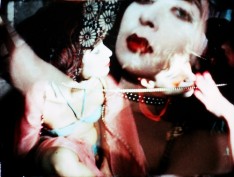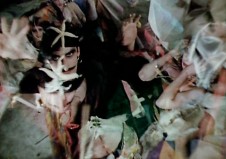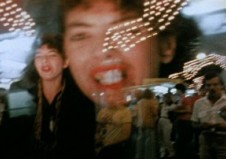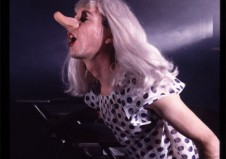Performance/Anxiety

Chumlum
Inspired by the upcoming exhibition Mike Kelley, Los Angeles Filmforum at MOCA presents a program of films and videos that explore questions of authority, performance, education, fantasy, and repression. Including works by Peggy Ahwesh; Abigail Child; Mike Kelley and Ericka Beckman; Owen Land (né George Landow); and Ron Rice; each piece in this program documents a subculture at the same time that it subverts, analyzes, and/or antagonizes so-called mainstream culture. Any interaction with authority or peers is a site for potential misunderstanding, trauma, humor, catharsis, and possibly transcendence; these works are riveting in their unflinching investigations of them all.
“Chumlum is as close to cinematic mercury as aural-optical alchemy will allow.” —Chuck Stephens, Cinemascope
“[Blind Country is] an avant-garde horror movie that is creepier than Caligari. Beckman provides the alternately evocative and socko visuals, and Kelley the punning text and painfully naked performance—all body loathing and castration anxiety. Shades of Frida Kahlo and George Orwell.” —Amy Taubin, Village Voice
FREE for MOCA and Los Angeles Filmforum members; must present current membership card to claim free tickets
INFO 213/621-1745 or education@moca.org

Chumlum
Chumlum
by Ron Rice (1964; 16mm, color, sound; 26 min.)
Featuring: Jack Smith, Beverly Grant, Mario Montez, Joel Markman, Frances Francine, Guy Henson, Barry Titus, Zelda Nelson, Gerard Malanga. Music by Angus McLise. Sound Technician: Tony Conrad.
"It's not unlike a bizarre dream, in riotous color." —New York Herald Tribune

The Film That Rises to the Surface of Clarified Butter
by Owen Land (1968; 16mm, black and white, sound; 8.75 min.)
“ ... as profoundly strange as its title.” —James Stroller, Village Voice

Mutiny
Mutiny
by Abigail Child (1983; 16mm; black and white, and color; sound; 9.5 min.)
Part Three of Is This What You Were Born For?
Mutiny employs a panoply of expression, gesture, and repeated movement. Its central images are of women: at home, on the street, at the workplace, at school, talking, singing, jumping on trampolines, playing the violin. The syntax of the film reflects the possibilities and limitations of speech, while “politically, physically, and realistically” flirting with the language of opposition. —Abigail Child

Blind Country
Blind Country
by Erica Beckman and Mike Kelley (1989; miniDV, color, sound; 20 min.)
Produced, directed, shot, and edited by Ericka Beckman; Written and performed by Mike Kelley;
Music: Bruce Darby; Featuring: Aura Rosenberg, Bob Gibson, Lolly Lincoln, Amanda Katz, Ian Bearce, Kim Keown, Lori Desantis, Adam Gilmore.
Blind Country is a collaboration between myself and filmmaker Ericka Beckman. It was inspired by the H.G. Wells short story ‘The Country of the Blind,’ which was a favorite of mine as an adolescent. I was both fascinated and repulsed by this tale of a man having to give up his eyes to live in an alien sightless society. In rereading it as an adult I was struck by the obvious fact, which I was oblivious to as a boy, that it is a castration story, and by the thinly veiled sexual and racial fears within it. Blind Country bears no discernible reference to the Wells story but instead plays with these subtle underlying themes. —Mike Kelley

Martina's Playhouse
Martina's Playhouse
Peggy Ahwesh (1989; Super 8 to video, color, sound; 30 min.)
A film about the riddles of our sexual construction and the complexities of play. —Peggy Ahwesh
"Since the mid-'70s, feminist filmmakers have taken up the gauntlet of visual representation, challenging sexist imagery with new paradigms of difference. One of the wittiest contenders is Ahwesh, whose film, Martina’s Playhouse, premiered at the Collective for Living Cinema. If the unprecedented success of Pee-Wee Herman suggests (let's hope) a potential crisis in masculinity, then Martina’s Playhouse signals that the equally artificial construct of femininity is ready to explode." —Manohla Dargis, Village Voice
